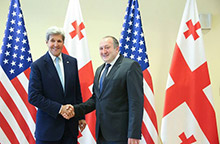
Nagorno-Karabakh Becomes Russia's Latest Protectorate in the South Caucasus  By Benyamin Poghosyan, PhD, Chairman, Center for Political and Economic Strategic Studies
By Benyamin Poghosyan, PhD, Chairman, Center for Political and Economic Strategic Studies
Azerbaijan, Turkey, and Russia all gained something as a result of the second Karabakh war, while Armenia and Nagorno-Karabakh lost almost everything.
The second Karabakh war ended with catastrophic results for Armenia and the Nagorno-Karabakh Republic. The trilateral statement signed by Russian, Armenian, and Azerbaijani leaders on November 10 was a clear capitulation of the Armenian sides. During the 26 long years of negotiations under the auspices of the OSCE Minsk Group, several settlement plans have been elaborated and offered to the conflict sides […]. However, none of them were as disastrous for Armenia and the Nagorno-Karabakh Republic as the trilateral statement of November 10, 2020. READ MORE
- EGF Editor |
Published on EGF: 26.11.2020
| External Relations
-
United States-Georgia Charter on Strategic Partnership: Defence and Security  By Eugene Kogan, Tbilisi-based defence and security expert
By Eugene Kogan, Tbilisi-based defence and security expert
Established in 2009, the United States-Georgia Charter on Strategic Partnership is based on four core pillars: Defense and Security Cooperation; Economic, Trade and Energy Cooperation; Strengthening Democracy; and Increasing People-to-People and Cultural Exchanges. As part of these two countries’ defence and security cooperation, the US provides financial support to the Georgian military, support for Georgia’s territorial defence and sovereignty, and, ultimately, for Georgia’s procurement of US defensive weapons. READ MORE
- EGF Editor |
Published on EGF: 25.11.2020
| External Relations
-
After the Elections, Georgia Needs to Walk Carefully on a Regional Tight Rope  By Benyamin Poghosyan, PhD, Chairman, Center for Political and Economic Strategic Studies
By Benyamin Poghosyan, PhD, Chairman, Center for Political and Economic Strategic Studies
On October 31, 2020, Parliamentary elections took place in Georgia. Since 2012 Georgian politics is often perceived as a two-men show - billionaire Bidzina Ivanishvili and former President Mikhail Saakashvili. In 2012, Mr. Ivanishvili made a surprisingly successful bid to win Parliamentary elections and ousted President Saakashvili's United National Movement (UNM) party from power. Saakashvili left Georgia in 2013 after the end of his second Presidential term and entered Ukrainian politics becoming the governor of the Odesa region. […] Meanwhile, several criminal investigations were opened against him in Georgia, and a court sentenced him in absentia to several years of imprisonment. Mr. Ivanishvili left the Prime Minister's position in late 2013, but continued to de facto govern Georgia through the ruling Georgian Dream (GD) party. READ MORE
- EGF Editor |
Published on EGF: 10.11.2020
| External Relations
-
Russian Strategy Before and During the New Karabakh War  By Benyamin Poghosyan, PhD, Chairman, Center for Political and Economic Strategic Studies
By Benyamin Poghosyan, PhD, Chairman, Center for Political and Economic Strategic Studies
The new war against the unrecognized Nagorno Karabakh Republic launched by Azerbaijan on September 27, 2020, has intensified discussions among the experts on the role of the external actors in the region. Significant attention was focused on the newly gained influence of Turkey as a supporter of Azerbaijan. However, as for now, the key player in the Karabakh conflict remains Russia, and most probably, this balance will not be changed at least in the short term perspective. READ MORE
- EGF Editor |
Published on EGF: 05.11.2020
| Security
-
Tactical Reasons Behind Military Breakthrough in Karabakh Conflict  By Fuad Shahbazov, Baku-based independent regional security and defence analyst
By Fuad Shahbazov, Baku-based independent regional security and defence analyst
Azerbaijan and Armenia have been locked in fierce fighting in Karabakh since September 27. Unlike in most previous clashes over this Armenian-occupied Azerbaijani territory, the present conflict has involved heavy and sophisticated weaponry wielded by both sides, but especially Azerbaijan’s Armed Forces. And while the ongoing violence is essentially a conventional war fought by two professional armies, the presence of new generation, hi-tech weaponry has sharply increased its destructive potential. READ MORE
- EGF Editor |
Published on EGF: 05.11.2020
| Security
-
New War in Nagorno-Karabakh and the Role of Great Powers: What is Next?  By Benyamin Poghosyan, PhD, Chairman, Center for Political and Economic Strategic Studies
By Benyamin Poghosyan, PhD, Chairman, Center for Political and Economic Strategic Studies
On September 27, 2020, Azerbaijan launched a large-scale attack along the whole line of contact with the Nagorno Karabakh Republic. This was the third flare-up in Karabakh conflict in recent four years. In April 2016, Azerbaijan again launched an attack on Karabakh, however, hostilities were stopped after four days as a result of active Russian mediation efforts without any significant changes on the ground. In July 2020, clashes broke out along the northern part of Armenia – Azerbaijan international border. However, the September 2020 attack has few in common with both April 2016 four day war and July 2020 border skirmishes. READ MORE
- EGF Editor |
Published on EGF: 24.10.2020
| Security
-
Why Did the Armenia-Azerbaijan Peace Process just Fail?  By Elkhan Nuriyev, PhD, Eastern Europe-Global Area (EEGA) fellow at Leipzig University
By Elkhan Nuriyev, PhD, Eastern Europe-Global Area (EEGA) fellow at Leipzig University
The ongoing escalation of Armenian-Azerbaijani conflict in Nagorno-Karabakh is a most serious and significant one - just not surprising at all. This is mainly due to the lack of tangible progress in the OSCE Minsk Group-led peace talks between the two sides, which have been held since 1994. The absence of substantive negotiations over de-occupation of Azerbaijani territories, return of internally-displaced persons to the regions of their origin, the unblocking of transport, economic and other communications with Armenia has fueled strong skepticism about peaceful conflict resolution. Back in the summer it was evident that the smell of a new war had already hung heavily over the conflict-torn area. READ MORE
- EGF Editor |
Published on EGF: 07.10.2020
| Security
-
Nagorno-Karabakh Crisis: Azerbaijan’s Fraying Temper  By Khayal Iskandarov Ibrahim, Rashad Tahirov Kamal, PhD in philology, associate professor Sadi Sadiyev Saleh
By Khayal Iskandarov Ibrahim, Rashad Tahirov Kamal, PhD in philology, associate professor Sadi Sadiyev Saleh
Another escalation in Nagorno-Karabakh in early morning on September 27, 2020 brought Armenian-Azerbaijani conflict once again to the focus of world community. Approximately 30 years have elapsed since this conflict was initiated. However, there has not been any substantial progress in the efforts to solve the problem. The prominent political figures in Armenia, who more or less understood the consequences of their actions and endeavored to solve the problem, were either ousted or assassinated. READ MORE.
- EGF Editor |
Published on EGF: 01.10.2020
| Security
-
The Recent Evolution of Azerbaijan–Turkey–Armenia–Russia Relations and Its Implications for the Settlement of the Karabakh Conflict  By Benyamin Poghosyan, PhD, Chairman, Center for Political and Economic Strategic Studies
By Benyamin Poghosyan, PhD, Chairman, Center for Political and Economic Strategic Studies
The July 2020 escalation along Armenia – Azerbaijan international border and following events have again put Armenia – Russia – Azerbaijan – Turkey relations in the spotlight of media and expert community. In recent years there was a wide spread perception that Azerbaijan has been making efforts to improve its relations with Russia, while Armenia – Russia relations entered an unchartered waters after the 2018 “Velvet revolution”. The large scale purchases of Russian modern weaponry by Azerbaijan were the main driver of improving bilateral relations. READ MORE
- EGF Editor |
Published on EGF: 30.09.2020
| Security
-
How to Break the Current Deadlock in Nagorno-Karabakh Conflict Resolution: Strategic Dialogue on the Peace Process within a Boosted Peace Context?
2020 Research Digest, edited by George Vlad NICULESCU, EGF Head of Research
The 2020 European Geopolitical Forum Research Digest aimed to explore the resilience of the Nagorno-Karabakh (NK) peace process driven by the implementation of the Madrid/Basic Principles, and the increased relevance of the peace context, created by various initiatives aiming to incentivize peaceful conflict resolution. It consists of three research papers drafted by distinguished Armenian, Azerbaijani, and Russian experts, who have been invited to respond generic questions such as: Are the Madrid Principles really dead? Why haven’t they been implemented so far? What are the Armenian perceived downsides of the Madrid Principles as the most plausible option for the Karabakh conflict resolution? Why does Azerbaijan support the Madrid Principles, and why does Baku believe they could still lead the way to a breakthrough in the peace process? What structural, institutional, conceptual, or operational changes could unblock the NK peace process, while taking advantage from a much needed boost of the peace context? READ MORE
Expert Peer-Review
 By Alan Whitehorn, Professor Emeritus in Political Science, The Royal Military College of Canada
By Alan Whitehorn, Professor Emeritus in Political Science, The Royal Military College of Canada
When there is so much shelling and yelling in the South Caucasus conflict over Nagorno-Karabakh, it is helpful to read a collection of thoughtful essays by knowledgeable authors from several differing countries and perspectives that appeared in The European Geopolitical Forum. Each piece is a welcome contribution, but nevertheless has key gaps and issues. I will comment on each in the order in which they appear. READ THE REVIEW
- EGF Editor |
Published on EGF: 30.09.2020
| Security
-
